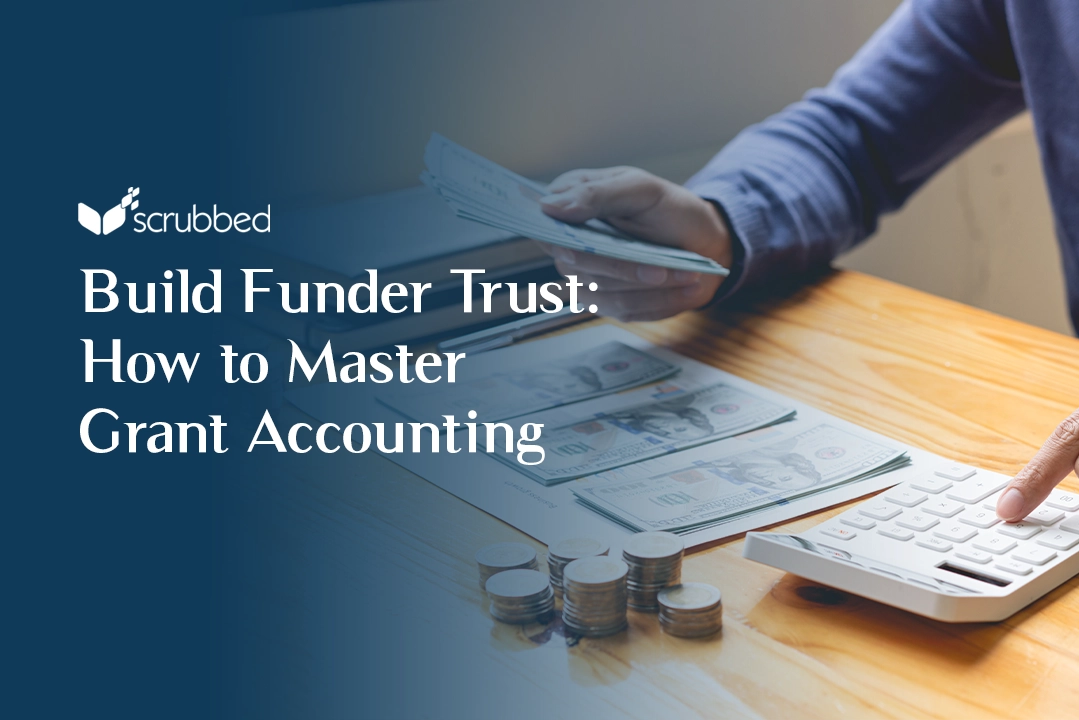At Scrubbed, we have extensive experience helping SaaS businesses achieve financial success. We’ve combined our knowledge and best practices into a clear and actionable 6-part series designed to maximize your profitability.
This fourth installment focuses on the funding and financing options available to SaaS businesses.
Launching and sustaining a SaaS company demands more than a fantastic product and ambitious dreams; it requires making the right financial decisions at each growth stage. Different funding options entail distinct financial considerations.
To fuel growth and development, SaaS businesses can explore various funding options, each with advantages and considerations.
Looking for Expert Accounting And Finance Support For Your SaaS Business? Click here!
Equity Funding
- Venture Capital (VC): Venture capital (VC) refers to money invested in a young, high-growth startup company with the potential for substantial future returns. This type of funding typically comes from specialized firms called venture capitalists (VCs) who manage pools of money from investors like pension funds and corporations.
VCs often invest in specific stages of a company’s growth, starting with the seed stage (early idea) and progressing to Series A, B, C, and beyond (later stages with proven traction). Each stage involves investing larger amounts of money in exchange for an increasing equity stake in the company.
VCs often bring more than just capital to the table. They can provide valuable guidance, mentorship, and access to networks to help SaaS businesses grow. This guidance can range from marketing and sales strategies to financial planning and talent acquisition.
However, VC investments are inherently risky. You have to be prepared for dilution of ownership, intense pressure to deliver immediate returns, and surrendering some control. It’s a high-risk, high-reward gamble, best suited for companies with ambitious growth plans and strong traction.
- Angel investors: Similar to VCs, angels are high-net-worth individuals who invest in individual companies, often at an earlier stage with smaller amounts. They typically offer seed funding – a vital cash injection for early-stage development– and mentorship for early-stage ventures. Their focus can be more specific, and their terms and conditions more flexible, potentially aligning well with niche SaaS startups.
In exchange for their investment, angel investors receive shares in the company. This means they become partial owners and stand to gain financially if the business succeeds through an acquisition or an initial public offering (IPO).
While the financial contribution is valuable, many angel investors also bring additional benefits to the table. They might offer mentorship, strategic advice, connections to their network, or even industry expertise relevant to SaaS businesses. This can be crucial for young companies navigating the challenges of growth and scaling.
However, it’s important to note that securing funding from an angel investor isn’t guaranteed. SaaS businesses need to have a strong vision, a compelling value proposition, and a demonstrably scalable business model to attract the attention of potential investors.
Debt Financing:
Debt financing is a way to raise capital without giving up any ownership stake in the company. Instead of receiving an investment in exchange for equity (shares of the company), you borrow money from a lender and agree to repay it with interest over a defined period. You retain control and avoid equity dilution, but interest payments and financial covenants can hinder your progress if not managed carefully. This option works well for established companies seeking short-term liquidity or manageable growth capital.
Some common types of debt financing used by SaaS businesses include:
- Bank loans: Traditional bank loans offer secured financing, often requiring collateral and strong financials. Interest rates can be lower than equity options, but the repayment schedules can be inflexible.
- Convertible notes: Convertible notes are a form of debt financing that can be converted into equity at a future financing round, typically at a discount to the valuation of the subsequent equity round. Convertible notes provide SaaS businesses with capital upfront while deferring the valuation and equity dilution until later, making them a flexible funding option for early-stage startups.
- Monthly recurring revenue (MRR) lines of credit: Similar to a credit card, you can draw on this line of credit as needed and repay it with interest.
- Venture debt: Similar to bank loans but geared towards VC-backed SaaS companies with higher risk tolerance. Venture debt offers larger sums with flexible terms, often used to bridge funding gaps or accelerate growth.
Alternative Funding Sources
Beyond the traditional launchpad, many SaaS businesses consider alternative sources:
- Accelerators and incubators: Accelerator and incubator programs provide early-stage SaaS businesses with capital, mentorship, networking opportunities, and resources in exchange for equity ownership or participation in the program. These programs typically offer structured support and guidance to help startups accelerate growth and achieve key milestones.
- Crowdfunding: Crowdfunding platforms, such as Kickstarter or Indiegogo, enable SaaS businesses to raise capital from a number of individual investors or backers through online fundraising campaigns. Crowdfunding can be equity-based, debt-based, or reward-based, depending on the platform and the terms of the campaign.
Crowdfunding typically favors tangible products with physical rewards rather than software-based services, and the focus is usually on the immediate or short-term reward rather than the long-term vision. However, it can be useful for early prototype validation and community building.
- Grants and awards: Government grants and industry awards, subsidies, or tax incentives can offer non-dilutive, non-repayable funding sources, particularly for early-stage companies or those addressing specific societal or technological challenges. They can be a valuable alternative or supplement to traditional funding methods, providing vital resources, including collaboration with research institutions or government agencies, without sacrificing ownership or incurring debt obligations.Common types of grants includes:
- Innovation grants: Support the development of novel technologies or solutions addressing specific problems.
- Research grants: Fund research and development activities with potential commercial applications.
- Small business grants: Provide general support for early-stage companies in particular industries or regions.
- Industry-specific awards: Recognize and reward excellence in specific sectors relevant to your SaaS offering.Securing a grant or award signifies recognition of your potential and can boost investor confidence while also helping you connect with relevant markets.
- Innovation grants: Support the development of novel technologies or solutions addressing specific problems.
- Revenue-based financing (RBF): Revenue-based financing provides capital to SaaS businesses in exchange for a percentage of future revenues. Unlike traditional debt financing, RBF does not require fixed repayments but instead involves repaying investors through a percentage of monthly revenues until a predetermined repayment cap is reached.While interest rates for RBF may be higher than traditional loans, this option avoids dilution and is accessible to younger companies.
- Strategic customers or pre-sales: This approach entails generating upfront revenue and funding by securing strategic customers or pre-selling subscriptions before fully launching the product or service. Strategic customers may provide upfront payments, commitments, or investments in exchange for early access, customization, or other benefits.Common Pre-Sales models include:
- Early access subscriptions: Offer limited access to features or functionality before full launch.
- Pre-orders: Customers pay upfront for future versions or full product access.
Founding member programs: Provide exclusive benefits and discounts to early supporters. - Strategic partnerships: SaaS businesses can secure funding through partnerships with larger companies or strategic investors. Strategic partnerships may involve investment, joint development efforts, distribution agreements, or other forms of collaboration that provide capital and strategic support.
- Early access subscriptions: Offer limited access to features or functionality before full launch.
Match Your Needs
The optimal funding solution depends on your stage, growth trajectory, and risk tolerance. The factors you need to consider include:
- Funding amount required: Different options cater to varying capital needs.
- Stage of your company: Early-stage ventures may face limited options, while established companies have broader choices.
- Control and ownership: Equity funding dilutes ownership, while debt preserves it. Before approaching investors, you need to understand how much control you want to retain.
- Repayment obligations: Debt incurs fixed payments, while equity exits may be unpredictable. Understanding your likely revenue streams is vital.
In summary, your role is to choose the source that best aligns with your growth stage, strategic goals, and risk tolerance. There’s no one-size-fits-all approach, so you need to customize your strategy to your specific needs and gather a strong network of advisors and mentors who can help you. At the same time, never underestimate the importance of financial preparation and open communication with investors. Transparency and trust are essential for a smooth and successful journey; having sound financial documentation goes a long way.
Whether you’re building a tech startup or exploring real estate accounting solutions, raising capital is just one step on your journey. The goal is to build a sustainable and valuable business; your funding choice must support that goal and not be an end in itself.
For more information about SaaS funding, check out Scrubbed’s Complete Guide to Raising Capital for SaaS Businesses.
How Scrubbed Can Help With Financing Options
SaaS businesses like yours turn to Scrubbed for accurate, high-quality accounting and finance services that enable them to plan, forecast, reduce risk, and grow. Our team is highly experienced in helping SaaS companies navigate the complexities of SaaS revenue and expense recognition, produce financials that satisfy investors and lenders, and develop budgets and forecasts that help you plan with confidence.
With our Technical Accounting Support, Scrubbed ensures compliance with evolving accounting standards while addressing complex reporting issues. The Scrubbed Accounting Group, Technical Accounting Group, Tax Group, and Corporate Advisory Group work together to address your accounting and finance challenges, so you can focus on your core business: developing and delivering robust software that meets your customers’ needs.
Contact us to see how we can help you prepare your SaaS business for pitching to investors and navigate the financial nuances of your funding support.







